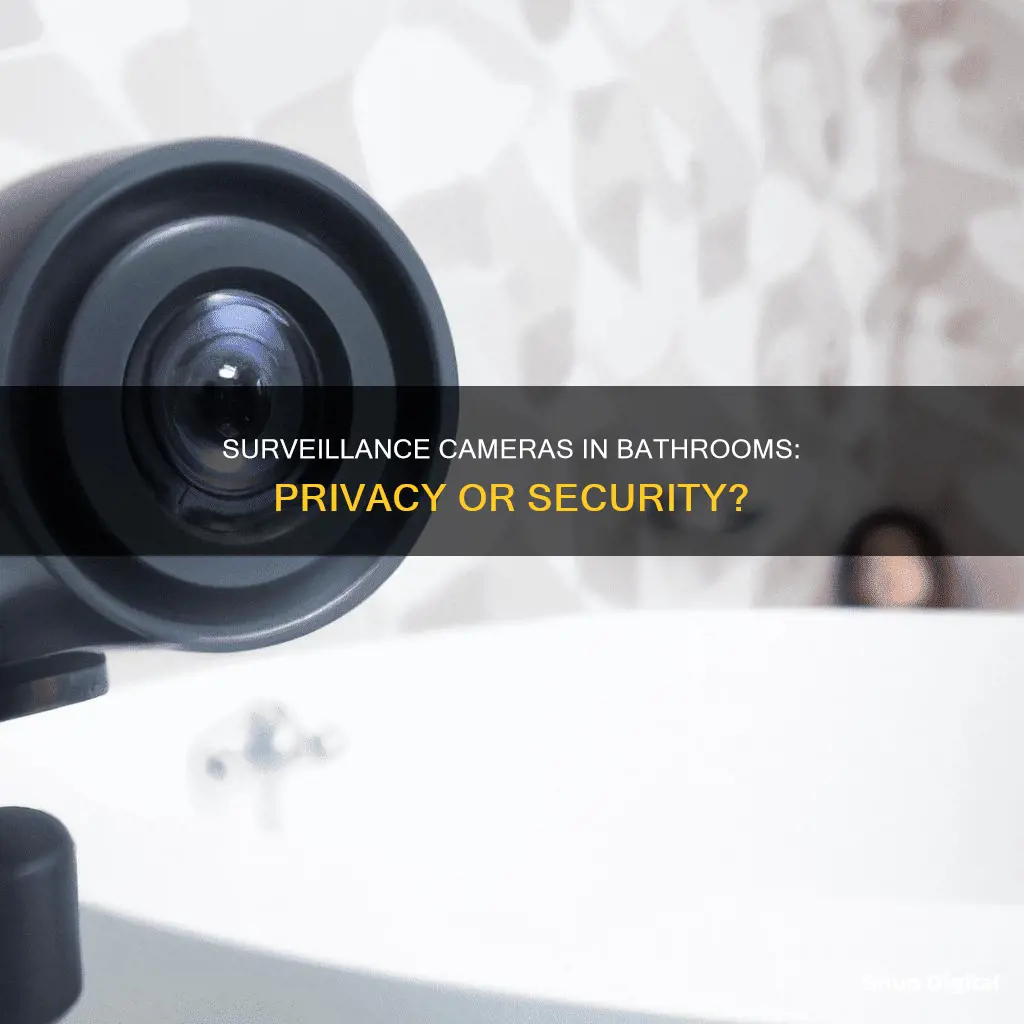
The presence of surveillance cameras in bathrooms is a highly controversial issue, with some businesses justifying their use for security purposes, while others argue that it is an invasion of privacy. In most states, it is deemed illegal to install cameras in bathrooms, as individuals have a reasonable expectation of privacy in these spaces. However, there have been instances where businesses have attempted to justify their use, such as in the case of a Virginia restaurant and club owner who installed a camera in the men's restroom to capture patrons entering, claiming it was to prevent vandalism. Nevertheless, the legality of such practices is questionable, and businesses should refrain from placing cameras in areas where individuals expect complete privacy, such as bathrooms and changing rooms.
| Characteristics | Values |
|---|---|
| Legality of surveillance cameras in bathrooms | Surveillance cameras in bathrooms are generally deemed illegal due to privacy concerns. However, the legality varies across different states and countries. |
| Reasons for installing cameras | Businesses may install cameras in bathrooms to prevent theft, vandalism, or drug use. |
| Public perception | Most people accept the use of video surveillance in certain areas due to its impact on crime levels, but some may have privacy concerns. |
| Alternatives to bathroom cameras | Businesses can hire security guards, refuse service to suspected individuals, or use other legal monitoring methods to ensure security without invading privacy. |
| State laws | Some states, such as California, explicitly prohibit surveillance cameras in bathrooms. Other states, like Delaware and Connecticut, require businesses to notify individuals about the presence of cameras that may invade privacy. |
What You'll Learn

Surveillance cameras in bathrooms at work
The presence of surveillance cameras in bathrooms at work is a complex issue that involves legal, ethical, and privacy considerations. While some may argue that surveillance cameras are necessary for security or loss prevention purposes, it is essential to respect employees' right to privacy.
In most jurisdictions, it is considered a violation of privacy to install surveillance cameras in bathrooms without explicit consent. Bathrooms are generally recognised as private spaces where individuals have a reasonable expectation of privacy. This expectation of privacy extends to commercial bathrooms, changing rooms, and other similar areas. Therefore, employers must refrain from placing surveillance cameras in these locations.
However, there may be exceptions to this rule. In certain states, employers are required to notify their employees about their intention to install surveillance cameras in restrooms and obtain their consent. This notification typically takes the form of written notices. Only after receiving approval from employees can employers proceed with the installation. It is worth noting that failure to comply with these requirements can result in severe consequences for employers.
It is important to emphasise that even with consent, there may be limitations on the placement of cameras within bathrooms. For example, in schools, security cameras in public bathrooms are typically stationary and restricted to common areas such as wash stations. They are not permitted to be positioned in private areas like stalls or mirrors.
When considering the use of surveillance cameras in the workplace, it is crucial to consult local laws and regulations. Additionally, obtaining explicit consent from employees and respecting their privacy rights should be fundamental ethical practices. Employers should explore alternative security measures or consider placing cameras outside of bathrooms, near entry and exit points, to achieve their security objectives without infringing on employees' privacy.
In summary, while the presence of surveillance cameras in bathrooms at work may be contentious, prioritising employees' privacy rights and adhering to legal guidelines are essential to maintaining a respectful and trustworthy work environment.
Charging Your Spy Gear Camera: How Long is Enough?
You may want to see also

Surveillance cameras in bathrooms in public spaces
The presence of surveillance cameras in bathrooms in public spaces is a highly contentious issue, with privacy concerns at the forefront of the debate. While some argue for the benefits of security and deterring vandalism or theft, others view it as an unacceptable intrusion of personal privacy.
Legality of Surveillance Cameras in Bathrooms
In most jurisdictions, it is considered a violation of privacy to install surveillance cameras in bathrooms without explicit consent. Bathrooms, both commercial and residential, are generally deemed private spaces where individuals have a reasonable expectation of privacy. This expectation of privacy extends to other areas such as changing rooms, locker rooms, bedrooms, hotel rooms, and any place where people undress.
However, there are exceptions to this rule. In certain cases, surveillance cameras may be installed in public bathroom spaces for security reasons or to prevent vandalism and theft. Even in these cases, there are strict conditions that must be adhered to. Surveillance cameras must be clearly visible, and prominent signs must be posted to inform individuals that they are being recorded.
Identifying Surveillance Cameras in Bathrooms
The very notion of surveillance cameras in bathrooms raises alarm bells for many people. If you suspect the presence of hidden cameras in bathrooms, there are a few methods you can employ to identify them:
- Signs and Notices: Look for signs or notices near the entrance or inside the bathroom informing you of video surveillance.
- Check Mirrors: One-way mirrors are sometimes used to conceal cameras. A simple way to check is by placing your fingertip on the mirror; if there is a gap between your fingertip and its reflection, it is a regular mirror. If there is no gap, it is likely a one-way mirror, indicating a possible hidden camera.
- Examine Suspicious Items: Surveillance cameras are often small and discreetly placed. Look out for items such as wall hooks, strange screws, power outlets, light fixtures, or unusual products like light bulbs or USB chargers that could conceal a camera.
- Use a Detector: Utilize a radio frequency detector device or a smartphone app designed to detect hidden cameras.
- Check for Wires: Hidden cameras require power, so look for any wires that could be supplying electricity to a concealed camera.
Taking Action Against Unauthorized Cameras
If you discover unauthorized surveillance cameras in bathrooms or other private spaces, it is important to take appropriate action to defend your privacy:
- Collect Evidence: Take photos or videos of the camera's location as evidence.
- Research Local Laws: Familiarize yourself with local laws regarding video surveillance in private spaces.
- Confront the Business Owner: If the cameras are in a public space, such as a restaurant or store, confront the business owner and inform them of your findings.
- Seek Legal Advice: Consult a lawyer to understand your legal options and take appropriate legal action if necessary.
The Intricate Art of Crafting Camera Lenses
You may want to see also

Surveillance cameras in bathrooms in private businesses
Surveillance cameras in bathrooms are typically considered an invasion of privacy. In most cases and places, installing security cameras in bathrooms is illegal. Bathrooms are considered private spaces, and individuals have a reasonable expectation of privacy when using them. This expectation of privacy extends to other private places such as bedrooms, changing rooms, locker rooms, hotel rooms, and any area where people undress.
However, there are exceptions to this rule. For example, security cameras in bathrooms may be permitted in specific contexts, such as in a drug-testing facility or a hospital, where constant monitoring of individuals may be necessary. In these exceptional cases, it is crucial to obtain proper consent and ensure that there is no ambiguity about the lack of privacy. This can be achieved through the use of consent forms, visible cameras, and clear signage indicating that there is no expectation of privacy in the bathroom.
In the context of private businesses, the legality of installing surveillance cameras in bathrooms depends on the state law and the specific circumstances. Some states, like California, prohibit the installation of surveillance mirrors in restrooms, showers, fitting rooms, or locker rooms. In Connecticut, employers are not allowed to operate surveillance equipment in areas designated for employee rest or comfort, including restrooms and locker rooms.
Generally, employers must balance their need for surveillance with their employees' right to privacy. While most employees accept video surveillance in public areas to prevent theft, installing cameras in bathrooms or locker rooms is often seen as an invasion of privacy. To comply with the law and respect their employees' privacy, employers should inform their staff about the presence of security cameras and obtain their consent, especially before installing cameras in sensitive areas.
It's worth noting that security cameras can be placed outside of bathrooms to monitor individuals entering and exiting without invading privacy. Additionally, in private residences, security cameras can be installed in bathrooms with the consent of all household members. However, if tenants are involved, the bathroom is considered a public space, and installing cameras without their consent is illegal.
Rexing Camera Charging: How to Know When They're Charged
You may want to see also

Legality of surveillance cameras in bathrooms
The legality of installing surveillance cameras in bathrooms depends on several factors, including the specific jurisdiction, the type of property, and whether proper consent and notification procedures have been followed.
Jurisdiction
In most jurisdictions, it is illegal to install video cameras in bathrooms without explicit consent. Bathrooms are generally considered private spaces where individuals have a reasonable expectation of privacy. However, there are some exceptions. For example, certain states like Florida, Alabama, and Minnesota allow hidden video surveillance in non-private settings.
Type of Property
The legality of surveillance cameras in bathrooms also depends on the type of property. Installing security cameras in your own private bathroom is generally acceptable, especially if all adult users are aware of and consent to the cameras. However, if you have tenants or boarders, installing cameras in shared bathrooms is typically not allowed. In the case of landlords or tenants installing cameras in shared bathrooms, it is considered an invasion of privacy.
Consent and Notification
In some states, employers or property owners are required to notify employees or tenants and obtain their consent before installing security cameras in restrooms. This is often done through written notices. Failure to provide proper notification and obtain consent can result in severe punishment for the property owner if found guilty of violating privacy laws.
To summarise, while the legality of surveillance cameras in bathrooms varies depending on the specific circumstances, it is generally advisable to respect individuals' privacy and obtain proper consent to avoid legal repercussions.
Disabling Camera Mode in VAM: A Step-by-Step Guide
You may want to see also

Alternatives to installing surveillance cameras in bathrooms
Installing surveillance cameras in bathrooms is a serious invasion of privacy and is generally not legal. However, if you are concerned about security and are considering installing cameras in the bathroom, there are alternative options to explore.
Hiring Security Guards
Well-trained security guards can be an effective alternative to surveillance cameras. They can patrol the premises, including restrooms, and their presence may act as a deterrent to potential vandals or thieves.
Refusing Service
Private businesses have the right to refuse service if they suspect a customer of stealing or vandalism. This can be an alternative way to address security concerns without resorting to surveillance in private areas.
Privacy Films or Curtains
Using privacy films or curtains on bathroom windows can provide an additional layer of security and peace of mind. These films distort the view from outside, allowing natural light in while preventing anyone from seeing inside. Curtains or blinds can also be closed to block the view, ensuring privacy for individuals using the restroom.
Cubicle Locks or Latches
In public bathrooms, the use of cubicle locks or latches can provide a sense of privacy. These locks secure the door of the cubicle, creating a barrier and preventing accidental or intentional intrusions.
Avoiding Suspicious Public Bathrooms
When using public restrooms, it is important to be vigilant and choose facilities in well-populated areas that appear clean and well-maintained. Avoid bathrooms in secluded or poorly lit areas, as they may pose a higher risk to your privacy and security.
It is essential to respect individuals' right to privacy, especially in intimate spaces like bathrooms. By implementing these alternative measures, you can enhance security without compromising privacy.
School Bus Camera Tickets: Where to Pay in Gwinnett County
You may want to see also
Frequently asked questions
Surveillance cameras in bathrooms are generally illegal. Bathrooms are places where individuals have a reasonable expectation of privacy.
Surveillance cameras in bathrooms violate an individual's right to privacy.
Surveillance cameras in bathrooms are illegal unless the individual has been notified of the presence of the camera(s) and has forfeited their right to privacy.
Surveillance cameras outside bathrooms are generally legal as long as they are not oriented in a manner that invades an individual's privacy, such as by pointing directly into the bathroom.
Alternatives to installing surveillance cameras in bathrooms include hiring security guards, refusing service, or placing cameras outside the bathroom to capture individuals entering and exiting.







